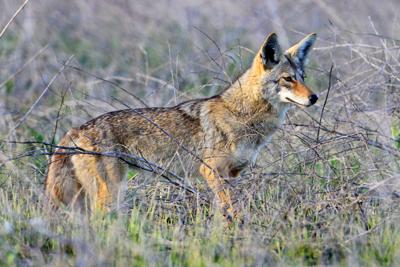Coyote trapping started as deer season ended in Lavaca County.
The slender, dog-like carnivores will eat pretty much anything and adapt well to different environments, enabling them to pose a range of threats to livestock, wildlife and property.
“It is very significant in some areas and not as much in others,” said Shannon Deforest, the county’s AgriLife Extension agent. “The primary concerns with our coyote population are livestock, of course, and also other wildlife, in terms of fawns and those types of things.”
The county is under contract with the Texas Wildlife Services Program for predatory trapping services until March 1 and offers a $5 bounty for coyotes through the Lavaca County Sheriff’s Office that has been in place for several years.
The contract for services from January to March 1, not to exceed $5,000, was approved at a Lavaca County Commissioners Court meeting in November.
The program is administered on an as-needed basis and annually starts after deer season to avoid disturbing deer populations from a hunting standpoint, Deforest said. Anyone with concerns related to coyotes can contact the county judge’s office to get on a list.
Outside the trapping period, people can also contact the Texas Wildlife Services Program for a troubleshooter on their own.
“Coyotes oftentimes will become a little too comfortable with the human population, and that is when they pose the largest threat,” he said. “We get calls all the time from folks with something as simple as backyard chickens and those type of things.”
With more than 150,000 farms and at least 24 cities topping 100,000 in population, Texas has the largest wildlife damage management program in the U.S.
The federal program is under the U.S. Department of Agriculture, Animal and Plant Health in cooperation with counties, rancher associations, individuals and entities, including the Texas A&M AgriLife Extension Service and Texas Wildlife Damage Management Association Inc.
DeWitt, Victoria and Calhoun counties also have contracts with trappers through the government program who provide services year-round for different nuisance and predatory animals.
Keith Wheat, Victoria’s trapper, said he mostly deals with issues related to coyotes and feral hogs.
“During the wintertime you have more coyote damage, you know, they’re hungry and hunting and moving around more,” he said. “But during the summertime, they tend to lay up and, of course, you’ve got more farm crops in the ground, and that is when the hogs are doing most of the crop damage.”
Feral hogs and coyotes are among the animals in Texas that the Texas Department of Parks and Wildlife does not require a person to have a license to shoot, although there are some circumstantial specifications and regulations regarding hunter education that still apply.
Hogs do property damage to pasture land, hay fields, yards and golf courses year-round, Wheat said.
“They even still come out of Riverside Park from time to time,” he said.
Reducing the population of nuisance or predatory animals is only one of multiple tools used to protect threatened animals, he said.
“Ranchers can relocate animals or pen them up at night; it just kind of depends on the situation,” he said. “Our main objective is not just out to kill every coyote or every hog in the world; our specialty is taking care of significant damage.”




